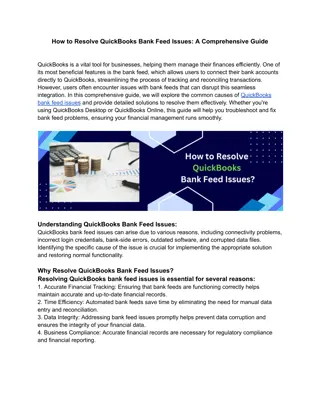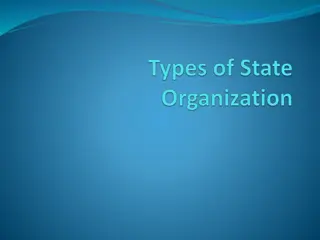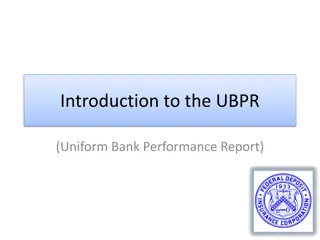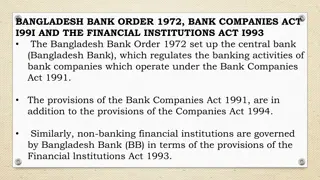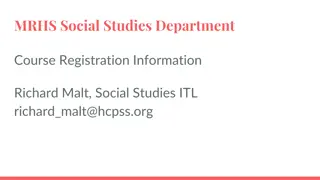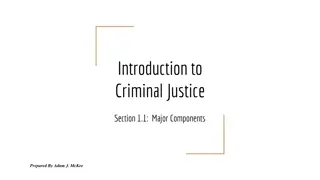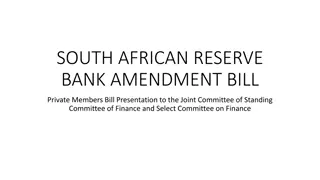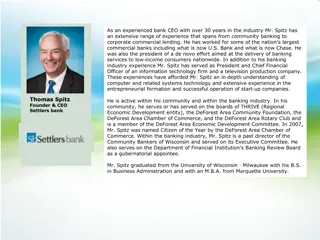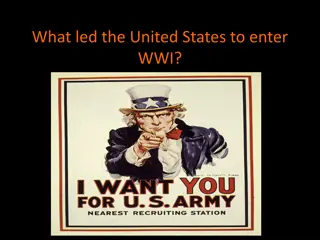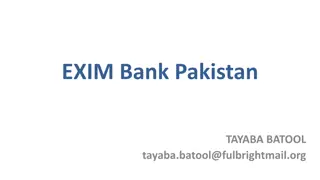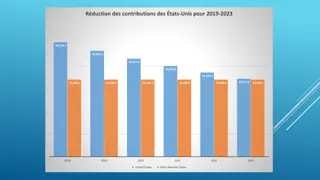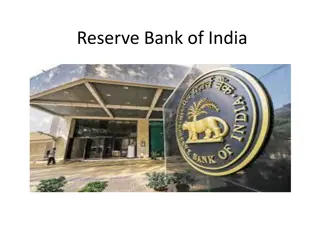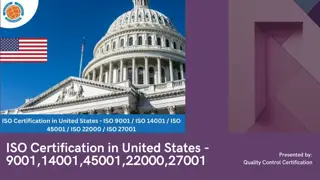The First Bank of the United States: A Historical Overview
The First Bank of the United States played a crucial role as a national issue, highlighting the connection between financial power and control. This historical institution, established during George Washington's presidency, shaped the early economic landscape of the United States. As students reflect on their academic progress, they are reminded of key topics in U.S. history such as Marbury v. Madison, the Louisiana Purchase, the Election of 1800, the Corp of Discovery, and factors leading to the War of 1812. Academic maturity and self-discipline are emphasized, encouraging students to invest effort for a meaningful educational experience.
Download Presentation

Please find below an Image/Link to download the presentation.
The content on the website is provided AS IS for your information and personal use only. It may not be sold, licensed, or shared on other websites without obtaining consent from the author. Download presentation by click this link. If you encounter any issues during the download, it is possible that the publisher has removed the file from their server.
E N D
Presentation Transcript
The First Bank of the United States The First Bank of the United States
Comments in Review The First Bank of the United States We are about three weeks away from the end of the semester and I know some of you are going to all of a sudden become more concerned about your grade. You will be provided time to share with me what grade you believe you deserve and why. This always makes for a great argumentative paper! It is also important to remember what the significant academic aspects are that we are trying to improve on this year. Your writing skills Your ability to develop a logical and meaningful argument Your reading skills in the sense that you want to be able to cite evidence to support your argument. Your critical listening skills, in that you need to be open to other opinions so that you know how to hear other ideas in order to have the respect of others who should be willing to listen to your thoughts
Comments in Review The First Bank of the United States In class there has been an emphasis on how to learn. In fact, all of what we are doing works together. I often hear, why was this on the test? We didn t talk about this in class! Remember, there many aspects of this class: The presentations and readings The projects The homework assignments Jeopardy (where the true/false, matching, fill-in questions come from) Pre Exam Essay questions (exam essays) Teachers are very intentional about what they do. You just have to listen and pay attention. I am more open about it, just to make the point. You need to be aware and look for clues!
Comments in Review Always remember!!! You only get out of something what you choose to put into it The First Bank of the United States If you choose to do very little, or look for shortcuts, you will get nothing out of this class! Don t make the excuse that you don t want to work hard because you don t like US History or you don t have time! Those are just excuses! This class is about self discipline, to be the best that you can be. Maybe, the best way to describe this class is that you are working towards developing academic maturity! Here are five key ideas (in order) regarding Topic 5 you need to focus on: 1. Marbury v. Madison (three points) 2. The Louisiana Purchase (three points) 3. Election of 1800 how was the tie between Jefferson and Burr resolved 4. Corp of Discovery - why was it important for the development of the US 5. What factors led to the War of 1812
Introduction It should be obvious why the Bank would become an immediate National issue! Whoever controls the money, controls the power! The First Bank of the United States The Constitution was ratified in June of 1788 and the new government was to set begin not quite a year later on March 4th 1789. George Washington was inaugurated on April 30th 1789 and immediately put together his cabinet. Two of his first appointees are Alexander Hamilton as Secretary of the Treasury and Thomas Jefferson Secretary of State. And it is the philosophical differences between these two we want to understand The First Bank of the United States is approved by Congress in February of 1791 and chartered for 20 years. To keep this all in perspective there is a lot going on in those first months and years of this new nation under the Constitution. The Bill of Rights isn t even ratified by December of 1791.
Alex Hamilton The First Bank of the United States Alexander Hamilton was a Federalist and an advocate for strong central government. His belief as was the Federalist party was to create a larger federal bureaucracy so that the citizens would become dependent on the Federal government. He had Washington s support to resolve the economic crisis that had been developing in the United States since the end of the Revolutionary War and through the Articles of Confederation. That being a large debt without any national currency. Hamilton s proposal was to consolidate the national debt from the states and to establish a Bank (like the British banks) to create an income for the Federal government.
The First Bank of the United StatesTom Jefferson In opposition to Hamilton, stood Thomas Jefferson, an Antifederalist the leader of the Democratic- Republicans. He believed that the power of the central government should be limited and that the individual states should hold more power. He was very much opposed to a strong central government in which the people were dependent upon. Jefferson also had this idealized viewpoint of an agrarian lifestyle, which is a political philosophy that establishes farming as a way of life which would best shape the ideal social values. It stresses the superiority of a simpler rural life as opposed to the complexity of city life which very much with Jefferson s political upbringing from Virginia.
The Debate The First Bank of the United States The debate, the argument and the political maneuvering has as much to do with personalities as it does about financial philosophies. These leaders of this new nation called the United States were well aware of the dynamics that were playing out as the country established itself. There are not many opportunities for people in history to create a new country ! The setting was perfect and these men knew that their actions would be recorded in history and that they would be remembered for many years to come. Ego s and entitlement issues towards one s place in history played just as much a part of this drama as anything.
The First Bank of the United States As previously mentioned, Hamilton as Secretary of the Treasury wanted to consolidate the national debt from the states and wanted to use the Bank to create an income for the Federal government. He wanted to create a large economic bureaucracy that people would become dependent on. He wanted the power. He also wanted to create a uniform central currency that would be consistent throughout all the states. Hamilton wanted to establish financial order, clarity and set a precedence for the United States which would also establish credibility for this new nation in the eyes of the rest of the world.
The First Bank of the United States Jefferson though, had his ideals that he was going to fight for. His ego along with his agrarian lifestyle focus was not going to be denied. He argued that the creation of a centralized Bank would increase the power of big business relative to that of agriculture, dooming his ideal society. Jefferson also argued that the United States Congress did not have the constitutional authority under the Constitution to establish such an institution. Jefferson and his constituents came to their conclusions in what would be labeled as a strict interpretation of the Constitution. That being that the Constitution should be read and interpreted literally, If the Bank was not mentioned in the Constitution, it was not legal. Banking should be left up to the individual states.
The First Bank of the United States Hamilton though would not be denied. In December of 1790, he made his proposal to Congress, requesting a National Bank which would be located in Philadelphia and chartered for 20 years. Hamilton requested that the Bank be able to lend the government money and hold its deposits, provide a new currency, and promote business by extending credit, which in turn would allow the government a means to make money. Hamilton's Nation Bank passed through Congress relatively easy but support for the Bank fell largely along sectional lines, with Northern endorsement and Southern opposition. (Compromise of 1790 and the location of Nation s capital) When the National Bank bill reached George Washington, there was doubt as to whether or not Washington would support it. Washington called on Hamilton to respond to Jefferson s concerns regarding the constitutionality of the National Bank.
The First Bank of the United States The argument between Hamilton and Jefferson over the bank came down to one question: was it constitutional? Hamilton s argument in constitutional support of the Bank was based on the Constitution s Preamble, the Elastic Clause. He held to a loose interpretation of the Constitution. The Elastic Clause gave Congress the right to make laws necessary and proper to carry out other powers of Congress. Therefore, in support of Hamilton, the Bank was allowed to move forward with Washington s support because the Preamble to the Constitution stated the purpose for creating a new government, including forming a more perfect union and promoting general welfare would indeed allow a National Bank to help stabilize the new county s economy and get the United States out of debt.
Defeat to Victory The First Bank of the United States For all its successes, Hamilton s bank could not overcome its political liabilities. When its charter came up for renewal in 1811, the Federalists were out of power; the Democratic-Republicans, who had remained hostile to the bank, now held the majority. Renewing Jefferson s attack of 20 years earlier, they charged that the bank was unconstitutional, and was not supported by the necessary-and-proper clause. This time there was no Hamilton to mount a passionate and brilliant defense; Aaron Burr had killed him in a pistol duel seven years earlier. Despite limited support, Congress let the charter expire, and the bank closed its doors on March 1811. But history has given the final economic victory to Hamilton. The economy that developed in this country could not realize the Jeffersonian agrarian ideal which would produce goods from their own resources and would be unassisted by banks and financial markets. Instead, it would embrace Hamilton s capitalist vision, which was a sophisticated commerce thriving on a sound currency and readily accessible to credit.
Divided Philosophies The First Bank of the United States








